
|
The Mathematical Association of America Maryland-District of Columbia-Virginia Section |
- Home
- History
- Main History Page
- Section History Document
- List of Past Officers
- Charter Members
- African-American Participation
- Stories from Section Members
- Section NExT Fellows
- Obituaries
- Smith Award Recipients
- Christensen Award Recipients
- Meritorious Service Award Recipients
- Undergraduate Award Winners
- Meeting Archive
- Past Meetings
- Talk Archive
- Old Section NExT Programs
- Newsletter Archive
- Meeting Minutes Archive
- Miscellaneous Documents
- Meetings
- Minutes
- Fall 2024 Executive
- Fall 2024 Membership
- Spring 2024 Executive
- Spring 2024 Membership
- Fall 2023 Executive
- Fall 2023 Membership
- Spring 2023 Executive
- Spring 2023 Membership
- Fall 2022 Executive
- Fall 2022 Membership
- Spring 2022 Executive
- Spring 2022 Membership
- Fall 2021 Executive
- Fall 2021 Membership
- Spring 2021 Executive
- Spring 2021 Membership
- Fall 2020 Executive
- Fall 2020 Membership
- Fall 2019 Executive
- Fall 2019 Membership
- Spring 2019 Executive
- Spring 2019 Membership
- Fall 2018 Executive
- Fall 2018 Membership
- Spring 2018 Executive
- Spring 2018 Membership
- Fall 2017 Executive
- Fall 2017 Membership
- Spring 2017 Executive
- Spring 2017 Membership
- Minutes Archive
- Newsletters
- Section NExT
- Awards
- Students
- Links
- Search
Spring 2023 Meeting at Virgina State University
Conference Links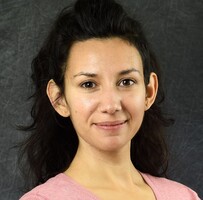
Marcella Torres (on behalf of MD-DC-VA COMMIT)University of RichmondFriday workshop: Authentic assessment in mathematics: expanding student opportunities while minimizing faculty workload Abstract: We all know that “real” math doesn't involve producing known answers to prompts in a timed setting, yet this is the skill we most commonly test in our students. Authentic assessments are an equitable and inclusive alternative, in which students apply knowledge gained in the classroom to meaningful tasks with real world applications. In mathematics courses, for example, an authentic assessment might be one that addresses skills such as communicating technical material or generating original problems. In this workshop, we will explore ways to expand our assessment toolbox, beginning by reflecting on what skills we want students to demonstrate at the end of our courses and beyond, and using these outcomes to guide the development of assessments. We will discuss how to build flexibility into grading schemes for these non-traditional assessments, and the inclusion of peer review and opportunities to revise in response to feedback. I will provide some examples of alternative assessments, rubrics, and student work in calculus, created as part of an ongoing study of the impact of alternative versus traditional assessment on student self-efficacy, time management, stress, engagement, and perceived learning. I will also share some of the ways I have reduced my workload while moving away from traditional exams &endash; a process that has not been without missteps and pitfalls along the way! The goal will be to spend some time developing a rough outline for an authentic assessment of one learning objective or student outcome for your course. Biographical Sketch: Biographical Sketch: Marcella Torres is Director of Mathematical Studies at University of Richmond, where she serves as the math faculty and co-coordinator for the UR Integrated Inclusive Science Program. She earned a B.S. in Mathematical Sciences from Virginia Commonwealth University in 2007, and Ph.D in Systems Modeling and Analysis, also from VCU, in 2019 after several years in the actuarial field and as an entrepreneur along the way. Marcella's research focuses on mathematical modeling of human biological systems and applying statistical methods to connect these mechanistic models to real data. While teaching, she is continually experimenting with active learning strategies and alternative grading systems to make mathematics more inclusive and engaging for diverse audiences. About MD-DC-VA COMMIT:
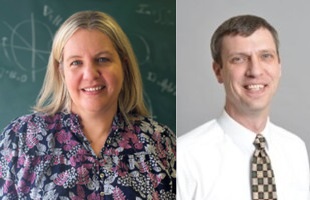
Karen Bliss & Greg HartmanSociety for Industrial and Applied Mathematics, Virginia Military InstituteBanquet Address: Cutting corners: you miter enjoy this talk Abstract: What happens when a math nerd reads the manual for a compound miter saw and spots a graph? He shares it with another woodshop-loving math nerd who is equally curious, and down the rabbit hole they go. We'll start with what a compound miter saw is and what it's used for, and talk about how we used calculus-level principles to explore some interesting ideas that come up when exploring the math of making boxes with a compound miter saw. Biographical Sketch:
Karen Bliss is the Senior Manager of Education and Outreach at the Society for Industrial and Applied Mathematics. In her prior work in academia, Karen was co-author of a couple of handbooks on math modeling was faculty at serving at the US Military Academy at West Point, Quinnipiac University, and the Virginia Military Institute. Outside of work she enjoys gardening and minor home improvement projects which cause her occasion to use a compound miter saw now and again. 
Candice R. PriceSmith CollegeSaturday Morning Address:Can we make grace the norm in our classrooms? Abstract: For much of my life, I was always confused about the way that people perceived the relationship between students and instructors in the classroom, especially in mathematics. There is such an adversarial relationship that even sharing my career choice with strangers leads to groans and stories of trauma. I believe this is what happens in a classroom without grace. So when we add grace the opposite should happen, right? During our time together, I hope to discuss with you the ways that I incorporate grace in my classroom and why many people think it is radical. I invite everyone to come and reflect on ways they can make grace the norm in their classrooms and spaces. Biographical Sketch: My name is Candice Price, and I am currently an associate professor in the department of Mathematics at Smith College in Northampton MA. I was born and raised in California and earned a bachelor's degree (2003) from California State University, Chico, and a master's degree (2007) from San Francisco State University, both in mathematics. I earned my doctoral degree (2012) in mathematics from the University of Iowa under the advisement of Isabel Darcy. My area of research is applied mathematics, with an emphasis on mathematical models for biological questions. I also have research interests in math education and problems in the intersection of mathematics and social justice. In my teaching, research, and service, I focus on a collaborative approach and view my work through the lens of inclusion and diversity. 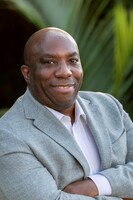
Edray GoinsPomona CollegeSaturday Afternoon Address: Growing MADDER: Building the “Mathematicians of the African Diaspora Database's Ensemble of Researchers” Abstract:
In 1997, Scott Williams (SUNY Buffalo) founded the website “Mathematicians of the African Diaspora,” which has since become widely known as the MAD Pages. Williams built the site over the course of 11 years, creating over 1,000 pages by himself as a personal labor of love. The site features more than 700 African Americans in mathematics, computer science, and physics as a way to showcase the intellectual prowess of those from the Diaspora. Soon after Williams retired in 2008, Edray Goins (Pomona College), Donald King (Northeastern University), Asamoah Nkwanta (Morgan State University), and Weaver (Varsity Software) have been working since 2015 to update the Pages. Edray Goins and Robin Wilson (Cal Poly Pomona) led a research group of 13 undergraduates during the 2021-22 academic year to write more biographies for the new MAD Pages. Biographical Sketch: Edray Herber Goins grew up in South Los Angeles, California. The product of the Los Angeles Unified (LAUSD) public school system, Goins attended the California Institute of Technology, where he majored in mathematics and physics, and earned his doctorate in mathematics from Stanford University. He has worked as a researcher at both Harvard and the National Security Agency; and has taught at both Caltech and Purdue. Goins is currently a Professor of Mathematics at Pomona College in Claremont, California. He has published over 25 journal articles in areas such as applied mathematics, graph theory, number theory, and representation theory; and on topics such as Diophantine equations, elliptic curves, and African Americans in mathematics. He runs a federally-funded Research Experience for Undergraduates (REU) titled Pomona Research in Mathematics Experience (PRiME). |
Copyright © 2023 - The Mathematical Association of America
Please send comments, suggestions, or corrections for this page to Brian Heinold at heinold@msmary.edu
Last Modified: 05/09/2023 - 03:20pm
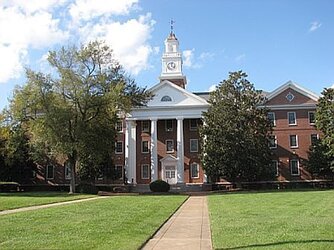 The Spring 2023 Meeting of the MD-DC-VA section of the MAA
was held at
The Spring 2023 Meeting of the MD-DC-VA section of the MAA
was held at 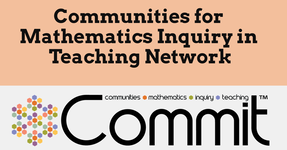 The MD-DC-VA COMMIT was formed in early 2016 (the group was originally called the MD-DC-VA IBL Consortium) as a network of college math instructors with a common interest in teaching and learning using inquiry. We recognize that teaching with inquiry can look very different in different contexts, and view our role as supporting instructors in utilizing the version that works for them and their students. Names that have been used for teaching with inquiry include: ambitious teaching, project-based learning, complex instruction, inquiry-oriented learning, discovery learning, inquiry-based learning, and student-centered teaching. We welcome members who are new to teaching with inquiry as well as those who are more experienced. Please join us!
See the
The MD-DC-VA COMMIT was formed in early 2016 (the group was originally called the MD-DC-VA IBL Consortium) as a network of college math instructors with a common interest in teaching and learning using inquiry. We recognize that teaching with inquiry can look very different in different contexts, and view our role as supporting instructors in utilizing the version that works for them and their students. Names that have been used for teaching with inquiry include: ambitious teaching, project-based learning, complex instruction, inquiry-oriented learning, discovery learning, inquiry-based learning, and student-centered teaching. We welcome members who are new to teaching with inquiry as well as those who are more experienced. Please join us!
See the